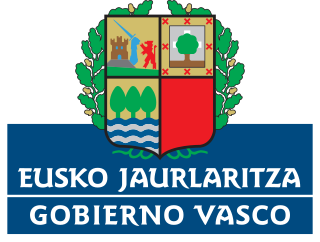
The Basque Government is the governing body of the Basque Autonomous Community of Spain. The head of the Basque government is known as the Lehendakari. The Lehendakari is appointed by the Basque Parliament every four years, after a regional election. Its headquarters are located in the Lakua district of Vitoria-Gasteiz in Álava.

The Department of Health is the department of the Basque Government responsible for the public health care system of the Basque Autonomous Community.
The Government of the Community of Madrid is the collegiate body charged with the executive and administrative functions of the autonomous community of Madrid, Spain. Until the 1998 reform of the regional statute it was formally called Council of Government of the Community of Madrid.

The government of Cristina Cifuentes was formed on 26 June 2015, following the latter's election as President of the Community of Madrid by the Assembly of Madrid on 24 June and her swearing-in on 25 June, as a result of the People's Party (PP) emerging as the largest parliamentary force at the 2015 Madrilenian regional election. It succeeded the González government and was the Government of the Community of Madrid from 26 June 2015 to 22 May 2018, a total of 1,061 days, or 2 years, 10 months and 26 days.

The Second Urkullu Government was the regional government of the Basque Country led by President (Lehendakari) Iñigo Urkullu between 2016 and 2020. It was formed in November 2016 after the regional election.
The third government of Esperanza Aguirre was formed on 17 June 2011, following her election as President of the Community of Madrid by the Assembly of Madrid on 15 June and her swearing-in on the next day, as a result of the People's Party (PP) emerging as the largest parliamentary force at the 2011 Madrilenian regional election with a third straight absolute majority of seats. It succeeded the second Aguirre government and was the Government of the Community of Madrid from 17 June 2011 to 28 September 2012, a total of 469 days.

The first government of Javier Lambán was formed on 6 July 2015, following the latter's election as President of the Government of Aragon by the Cortes of Aragon on 3 July and his swearing-in on 5 July, as a result of the Spanish Socialist Workers' Party (PSOE) and the Aragonese Union (CHA) being able to muster a majority of seats in the Cortes with external support from Podemos and United Left (IU) following the 2015 Aragonese regional election. It succeeded the government of Luisa Fernanda Rudi and was the Government of Aragon from 6 July 2015 to 6 August 2019, a total of 1,492 days, or 4 years and 1 month.

The second government of Susana Díaz was formed on 18 June 2015 following the latter's reelection as President of Andalusia by the Parliament of Andalusia on 11 June and her swearing-in on 14 June, as a result of the Socialist Party of Andalusia (PSOE-A) emerging as the largest parliamentary force at the 2015 Andalusian regional election. It succeeded the first Díaz government and was the Government of Andalusia from 18 June 2015 to 22 January 2019, a total of 1,314 days, or 3 years, 7 months and 4 days.

The first government of Juanma Moreno was formed on 22 January 2019, following the latter's election as President of the Regional Government of Andalusia by the Parliament of Andalusia on 16 January and his swearing-in on 18 January, as a result of the People's Party (PP) and Citizens (Cs) being able to muster a majority of seats in the Parliament with external support from Vox following the 2018 Andalusian regional election. It succeeded the second Díaz government and was the Regional Government of Andalusia from 22 January 2019 to 26 July 2022, a total of 1,281 days, or 3 years, 6 months and 4 days.
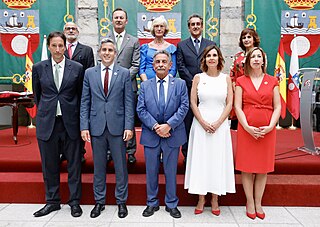
The second government of Miguel Ángel Revilla was the regional government of Cantabria during the 10th legislature (2019–2023).

The first government of Adrián Barbón was formed on 25 July 2019, following the latter's election as President of the Principality of Asturias by the General Junta of the Principality of Asturias on 15 July and his swearing-in on 17 July, as a result of the Spanish Socialist Workers' Party (PSOE) emerging as the largest parliamentary force at the 2019 regional election. It succeeded the second Fernández government and was the incumbent Government of the Principality of Asturias between 25 July 2019 and 31 July 2023, a total of 1,467 days, or 4 years and 6 days.

The second government of Fernando López Miras was formed on 1 August 2019, following the latter's election as President of the Region of Murcia by the Regional Assembly of Murcia on 26 July and his swearing-in on 29 July, as a result of the People's Party (PP) allying itself with Citizens (Cs) and mustering the external support from Vox in exchange for policy compromises following the 2019 Murcian regional election. It succeeded the first López Miras government and has been the incumbent government of the Region of Murcia since 1 August 2019, a total of 1,914 days, or 5 years, 2 months and 26 days.

The Third Urkullu Government was the regional government of the Basque Country led by President (Lehendakari) Iñigo Urkullu between 2020 and 2024. It was formed in September 2020 after the regional election.

The government of Pere Aragonès was formed on 26 May 2021 following the latter's election as President of the Government of Catalonia by the Parliament of Catalonia on 21 May and his swearing-in on 24 May, as a result of Republican Left of Catalonia (ERC) and Together for Catalonia (Junts) being able to muster a majority of seats in the Parliament with external support from the Popular Unity Candidacy (CUP) following the 2021 Catalan regional election. It succeeded the Torra government and was the Government of Catalonia from 26 May 2021 to 12 August 2024, a total of 1,174 days, or 3 years, 2 months and 17 days.
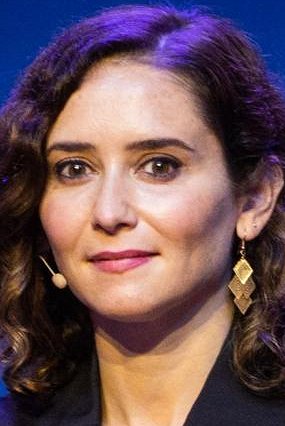
The second government of Isabel Díaz Ayuso was formed on 21 June 2021, following the latter's reelection as President of the Community of Madrid by the Assembly of Madrid on 18 June and her swearing-in on the next day, as a result of the People's Party (PP) emerging as the largest parliamentary force at the 2021 Madrilenian regional election. It succeeded the first Ayuso government and was the Government of the Community of Madrid from 21 June 2021 to 23 June 2023, a total of 732 days, or 2 years and 2 days.

The government of Yolanda Barcina was formed on 2 July 2011, following the latter's election as President of the Government of Navarre by the Parliament of Navarre on 23 June and her swearing-in on 1 July, as a result of Navarrese People's Union (UPN) emerging as the largest parliamentary force at the 2011 Navarrese regional election and forming an alliance together with the Socialist Party of Navarre (PSN–PSOE), with which it held a majority in the Parliament. It succeeded the fourth Sanz government and was the Government of Navarre from 2 July 2011 to 23 July 2015, a total of 1,482 days, or 4 years and 21 days.
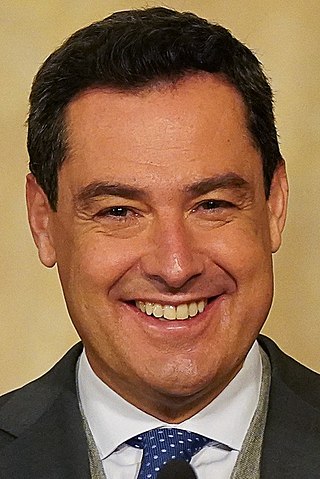
The second government of Juanma Moreno was formed on 26 July 2022, following the latter's election as President of the Regional Government of Andalusia by the Parliament of Andalusia on 21 July and his swearing-in on 23 July, as a result of the People's Party (PP) emerging as the largest parliamentary force at the 2022 Andalusian regional election with an absolute majority of seats. It succeeded the first Moreno government and has been the incumbent Regional Government of Andalusia since 26 July 2022, a total of 824 days, or 2 years, 3 months and 1 day.
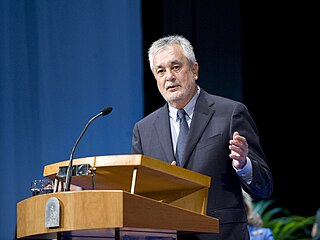
The first government of José Antonio Griñán was formed on 24 April 2009 following the latter's election as President of Andalusia by the Parliament of Andalusia on 22 April and his swearing-in on 23 April, as a result of the resignation of the former president, Manuel Chaves, upon his nomination as Third Deputy Prime Minister in the second government of José Luis Rodríguez Zapatero. It succeeded the sixth Chaves government and was the Government of Andalusia from 24 April 2009 to 7 May 2012, a total of 1,109 days, or 3 years and 13 days.














